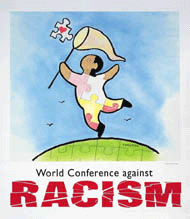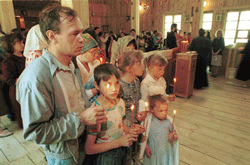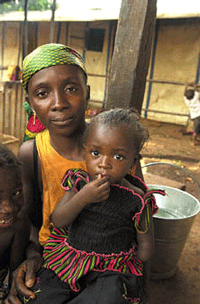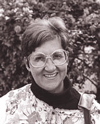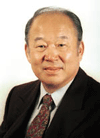|
WCC News
Produced by:
WCC Public Information Team
Guest editor for this issue:
Allison Bidaisee
Managing editor:
Kristine Greenaway
For further information write to:
WCC NEWS
WCC Communication
P. O. Box 2100
1211 Geneva 2
Switzerland
Telephone: (41-22) 791 6111
General Fax: (41-22) 791 0361br>
E-mail for enquiries
WCC Communication fax:
(41 22) 798 1346
Design: Marie Arnaud Snakkers
Printed in Switzerland
©WCC
Original: english |
|
|
MACEDONIAN RELIGIOUS LEADERS
STRESS PEACE AND RECONCILIATION
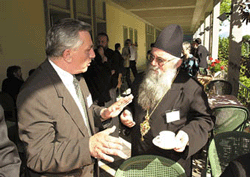
Mr Jagup Selimovski, Director of Religious Affairs (Islamic Union of Macedonia), right, with Metropolitan Timotej of Debar and Kichevo (Macedonian Orthodox Church) at the round table meeting. |
"We affirm that peace is too important to leave only to the politicians. Peace is also a responsibility of the churches and of the religious community. We strongly believe that answers to problems should always be sought with an open, constant dialogue, based on a complete, mutual respect and on the respect of the differences and the values of other religious traditions and communities." These words are part of a joint statement agreed to by 19 religious leaders from the Federal Yugoslav Republic (FYR) of Macedonia who openly and willingly pledged a united commitment to a process of peace, reconciliation and healing. |
Representing the religious communities of Macedonia’s Orthodox Church, Islamic Union, Catholic Church, United Methodist Church and Jewish community, the leaders gathered for a round table meeting in Morges, Switzerland, 11-13 June. It was chaired by Archbishop Anastasios, head of the Orthodox Autocephalous Church of Albania. Convened by the World Council of Churches (WCC) in cooperation with the Conference of European Churches (CEC) and with the assistance of the Macedonian Centre for International Cooperation (MCIC), this meeting came amidst continued tensions in Macedonia.
Such a unified front of the religious leaders is a step towards a much-needed peaceful resolution. "The confrontation between the Macedonian military and the ethnic Albanian rebels has led to widespread displacement of civilians and the risk of a humanitarian crisis in some parts of the country," says Alexander Belopopsky, WCC programme executive for Europe. He added that the violence "raises the risk of broader inter-ethnic and inter-communal violence and threatens the multi-cultural character of the society".
FURTHERING ECUMENICAL DIALOGUE IN NORTHERN IRELAND
"The Joint Working Group (JWG) saw some ways in which some churches - Protestant and Roman Catholic - have been struggling to overcome stereotypes and situations of alienation. While it is expected that this experience of listening to the work of churches in a specific situation will have an impact on the way in which the JWG operates in the future, the insights and experiences of those invited to address the meeting will also help to clarify the understanding and practice of ecumenical dialogue itself," said World Council of Churches (WCC) Faith and Order team coordinator, Rev. Dr Alan Falconer. He was speaking of the second plenary meeting of the JWG between the Roman Catholic Church (RCC) and the WCC, held in Dromantine, Northern Ireland, 25-31 May. Moderators were Bishop Mario Conti, Roman Catholic bishop of Aberdeen, Scotland, and Bishop Jonas Jonson, Lutheran bishop of Strängnäs, Sweden.
The plenary agreed on a process and methodology for work related to the ecclesial consequences of mutual recognition of baptism, and reviewed an interim report on the sub-committee which assessed national and regional councils of churches.
The JWG also visited Armagh and Belfast to familiarize themselves with the present situation. These visits were preceded by plenary briefings on violence and sectarianism in the region and participants also looked at initiatives to address the situations by churches in Ireland.
The next JWG plenary will take place May 2002 in Sweden.
CUBAN COUNCIL OF CHURCHES, SERVING ITS PEOPLE FOR 60 YEARS
"United To Serve", the watchword of the Cuban Council of Churches, describes the sentiments expressed by participants in the Council’s 60th-anniversary celebrations. Invitees and participants all acknowledged the need for continued collaborative efforts towards achieving a better future, lasting peace and justice for all.
This message was stressed by Dr Reinerio Arce Valentín, president of the Cuban Council of Churches, and Rev. Dr Emilio Castro, former general secretary of the World Council of Churches (WCC). Both leaders reiterated the important role of the church in the community, the need for deep reflection by the church, families and society at large, and the need for unified, sustained efforts towards eradicating violence and finding lasting peace for all humankind.
During the celebrations, the Council also took the opportunity to launch the Decade to Overcome Violence campaign in Cuba.
ECUMENICAL SUPPORT FOR PEACE IN THE HOLY LAND
In supporting efforts for a negotiated peace process in the Holy Land, WCC general secretary Rev. Dr Konrad Raiser has convened an international ecumenical consultation, 6-7 August in Geneva, "to strengthen broad international ecumenical support for a comprehensive peace based on justice and security" for the Palestinian and Israeli people. This will specifically focus on providing space for open sharing, consultation, joint planning and strategizing, and facilitating better coordination and cooperation in the future.
BUILDING ECUMENISM THROUGH THE WEB
Young people worldwide who are interested in the ecumenical movement and want to meet, discuss, share and learn from each other can now do so via the WCC youth ecumenical website. The website seeks to strengthen the ecumenical youth movement among young Christians across different cultures.
Designed to complement already existing regional and denominational-based networks, the WCC youth website includes upcoming events, discussion boards and Bible studies. Links are also provided to the other ecumenical organizations and, by extension, their youth sites. |
